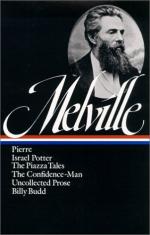“No, not that; but—”
“I see, lady; I may do it, by your leave, but not by your word; the wonted way of ladies. There, it is done. Sweeter that kiss, than the bitter heart of a cherry.”
When at length this lady left, no small talk was had by her with her companions about someway relieving the hard lot of so knightly an unfortunate. Whereupon a worthy, judicious gentleman, of middle-age, in attendance, suggested a bottle of good wine every day, and clean linen once every week. And these the gentle Englishwoman—too polite and too good to be fastidious—did indeed actually send to Ethan Allen, so long as he tarried a captive in her land.
The withdrawal of this company was followed by a different scene.
A perspiring man in top-boots, a riding-whip in his hand, and having the air of a prosperous farmer, brushed in, like a stray bullock, among the rest, for a peep at the giant; having just entered through the arch, as the ladies passed out.
“Hearing that the man who took Ticonderoga was here in Pendennis Castle, I’ve ridden twenty-five miles to see him; and to-morrow my brother will ride forty for the same purpose. So let me have first look. Sir,” he continued, addressing the captive, “will you let me ask you a few plain questions, and be free with you?”
“Be free with me? With all my heart. I love freedom of all things. I’m ready to die for freedom; I expect to. So be free as you please. What is it?”
“Then, sir, permit me to ask what is your occupation in life—in time of peace, I mean?”
“You talk like a tax-gatherer,” rejoined Allen, squinting diabolically at him; “what is my occupation in life? Why, in my younger days I studied divinity, but at present I am a conjurer by profession.”
Hereupon everybody laughed, equally at the manner as the words, and the nettled farmer retorted:
“Conjurer, eh? well, you conjured wrong that time you were taken.”
“Not so wrong, though, as you British did, that time I took Ticonderoga, my friend.”
At this juncture the servant came with the punch, when his master bade him present it to the captive.
“No!—give it me, sir, with your own hands, and pledge me as gentleman to gentleman.”
“I cannot pledge a state-prisoner, Colonel Allen; but I will hand you the punch with my own hands, since you insist upon it.”
“Spoken and done like a true gentleman, sir; I am bound to you.”
Then receiving the bowl into his gyved hands, the iron ringing against the china, he put it to his lips, and saying, “I hereby give the British nation credit for half a minute’s good usage,” at one draught emptied it to the bottom.
“The rebel gulps it down like a swilling hog at a trough,” here scoffed a lusty private of the guard, off duty.
“Shame to you!” cried the giver of the bowl.




